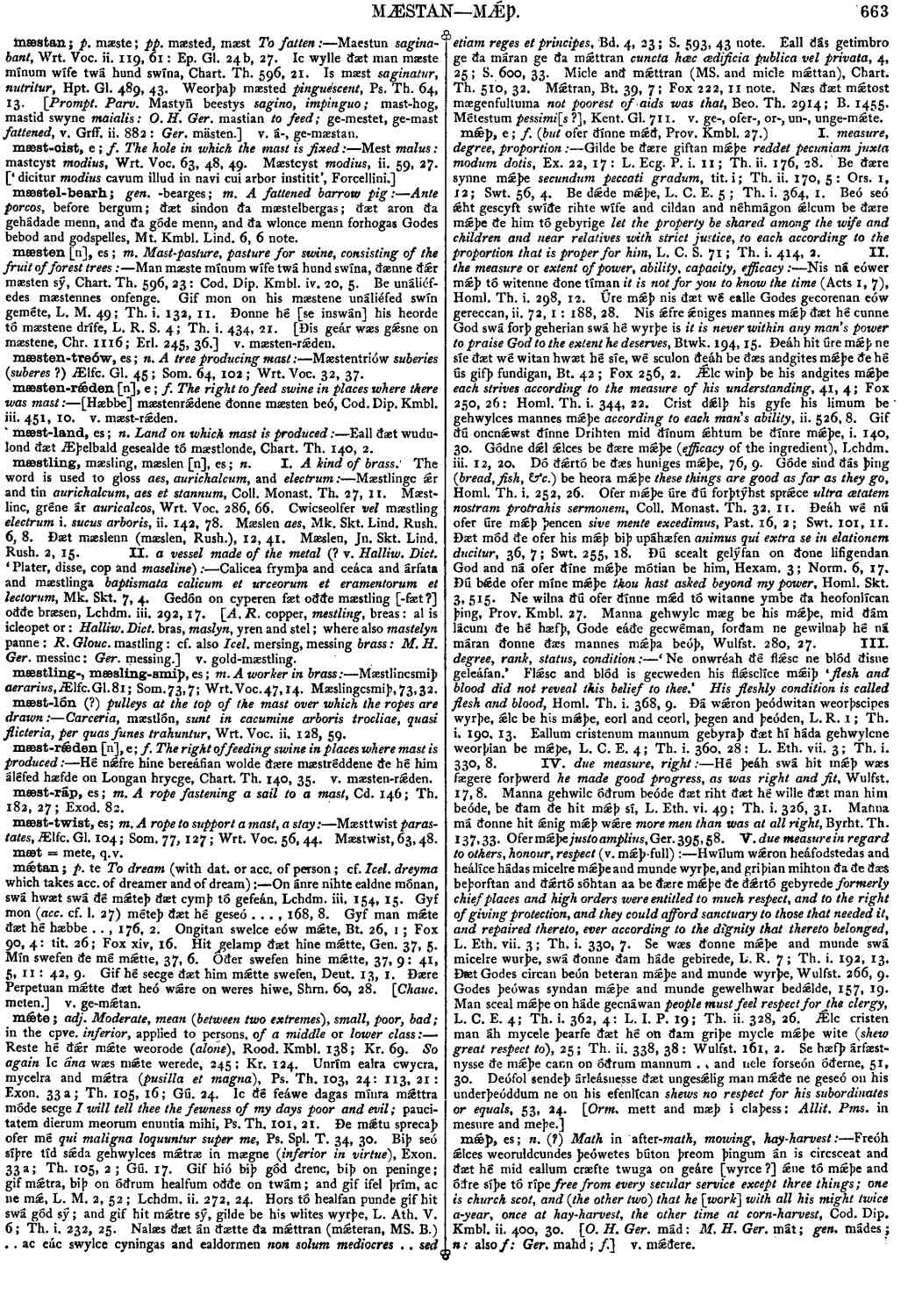mǽþ
- noun [ feminine ]
- Prov. Kmbl. 27. )
-
Gilde be ðære giftan mǽþe
reddet pecuniam juxta modum dotis,
- Ex. 22, 17: L. Ecg. P. i. 11 ;
- Th. ii. 176, 28.
-
Be ðære synne mǽþe
secundum peccati gradum,
- tit. i ;
- Th. ii. 170, 5: Ors. 1, 12 ;
- Swt. 56, 4.
-
Be dǽde mǽþe,
- L. C. E. 5 ;
- Th. i. 364, 1.
-
Beó seó ǽht gescyft swíðe rihte wífe and cildan and néhmágon ǽlcum be ðære mǽþe ðe him tó gebyrige
let the property be shared among the wife and children and near relatives with strict justice, to each according to the proportion that is proper for him,
- L. C. S. 71 ;
- Th. i. 414, 2.
-
Nis ná eówer mǽþ tó witenne ðone tíman
it is not for you to know the time
- (
- Acts 1, 7 ),
- Homl. Th. i. 298, 12.
-
Úre mǽþ nis ðæt wé ealle Godes gecorenan eów gereccan,
- ii. 72, 1: 188, 28.
-
Nis ǽfre ǽniges mannes mǽþ ðæt hé cunne God swá forþ geherian swá hé wyrþe is
it is never within any man's power to praise God to the extent he deserves,
- Btwk. 194, 15.
-
Ðeáh hit úre mǽþ ne síe ðæt wé witan hwæt hé síe, wé sculon ðeáh be ðæs andgites mǽþe ðe hé ús gifþ fundigan,
- Bt. 42 ;
- Fox 256, 2.
-
Ǽlc winþ be his andgites mǽþe
each strives according to the measure of his understanding,
- 41, 4 ;
- Fox 250, 26: Homl. Th. i. 344, 22.
-
Crist dǽlþ his gyfe his limum be gehwylces mannes mǽþe
according to each man's ability,
- ii. 526, 8.
-
Gif ðú oncnǽwst ðinne Drihten mid ðínum ǽhtum be ðínre mǽþe,
- i. 140, 30.
-
Gódne dǽl ǽlces be ðære mǽþe (
efficacy
of the ingredient).- Lchdm. iii. 12, 20.
-
Dó ðǽrtó be ðæs huniges mǽþe,
- 76, 9.
-
Góde sind ðás þing (bread, fish, &c.) be heora mǽþe
these things are good as far as they go,
- Homl. Th. i. 252, 26.
-
Ofer mǽþe úre ðú forþtýhst sprǽce
ultra ætatem nostram protrahis sermonem,
- Coll. Monast. Th. 32, 11.
-
Ðeáh wé nú ofer úre mǽþ þencen
sive mente excedimus,
- Past. 16, 2 ;
- Swt. 101, 11.
-
Ðæt mód ðe ofer his mǽþ biþ upáhæfen
animus qui extra se in elationem ducitur,
- 36, 7 ;
- Swt. 255, 18.
-
Ðú scealt gelýfan on ðone lifigendan God and ná ofer ðíne mǽþe mótian be him.
- Hexam. 3 ;
- Norm. 6, 17.
-
Ðú bǽde ofer míne mǽþe
thou hast asked beyond my power.
- Homl. Skt. 3, 515.
-
Ne wilna ðú ofer ðínne mǽd tó witanne ymbe ða heofonlícan þing.
- Prov. Kmbl. 27.
-
Manna gehwylc mæg be his mǽþe, mid ðám lácum ðe hé hæfþ, Gode eáðe gecwéman, forðam ne gewilnaþ hé ná máran ðonne ðæs mannes mǽþa beóþ.
- Wulfst. 280, 27.
-
'Ne onwréah ðé flǽsc ne blód ðisne geleáfan.' Flǽsc and blód is gecweden his flǽsclíce mǽiþ
'flesh and blood did not reveal this belief to thee.' His fleshly condition is called flesh and blood,
- Homl. Th. i. 368, 9.
-
Ðá wǽron þeódwitan weorþscipes wyrþe, ǽlc be his mǽþe, eorl and ceorl, þegen and þeóden,
- L. R. 1 ;
- Th. i. 190, 13.
-
Eallum cristenum mannum gebyraþ ðæt hí háda gehwylcne weorþian be mǽþe,
- L. C. E. 4 ;
- Th. i. 360, 28 : L. Eth. vii. 3 ;
- Th. i. 330, 8.
-
Hé þeáh swá hit mǽþ wæs fægere forþwerd
he made good progress, as was right and fit.
- Wulfst. 17, 8.
-
Manna gehwilc óðrum beóde ðæt riht ðæt hé wille ðaet man him beóde, be ðam ðe hit mǽþ sí,
- L. Eth. vi. 49 ;
- Th. i. 326, 31.
-
Manna má ðonne hit ǽnig mǽþ wǽre
more men than was at all right.
- Byrht. Th. 137, 33.
-
Ofer mǽþe
justo amplius.
- Ger. 395, 58.
-
Hwílum wǽron heáfodstedas and heálíce hádas micelre mǽþe and munde wyrþe, and griþian mihton ða ðe ðæs beþorftan and ðǽrtó sóhtan aa be ðære mǽþe ðe ðǽrtó gebyrede
formerly chief places and high orders were entitled to much respect, and to the right of giving protection, and they could afford sanctuary to those that needed it, and repaired thereto, ever according to the dignity that thereto belonged,
- L. Eth. vii. 3 ;
- Th. i. 330, 7.
-
Se wæs ðonne mǽþe and munde swá micelre wurþe, swá ðonne ðam háde gebirede,
- L. R. 7 ;
- Th. i. 192, 13,
-
Ðæt Godes circan beón beteran mǽþe and munde wyrþe,
- Wulfst. 266, 9.
-
Godes þeówas syndan mǽþe and munde gewelhwar bedǽlde,
- 157, 19.
-
Man sceal mǽþe on háde gecnáwan
people must feel respect for the clergy,
- L. C. E. 4 ;
- Th. i. 362, 4: L. I. P. 19 ;
- Th. ii. 328, 26.
-
Ǽlc cristen man áh mycele þearfe ðæt hé on ðam griþe mycle mǽþe wite (
shew great respect to
),- 25 ;
- Th. ii. 338, 38: Wulfst. 161, 2.
-
Se hæfþ árfæstnysse ðe mǽþe cann on óðrum mannum . . and nele forseón óðerne,
- 51, 30.
-
Deófol sendeþ árleásnesse ðæt ungesǽlig man mǽðe ne geseó on his underþeóddum ne on his efenlícan
shews no respect for his subordinates or equals,
- 53, 24.
Bosworth, Joseph. “mǽþ.” In An Anglo-Saxon Dictionary Online, edited by Thomas Northcote Toller, Christ Sean, and Ondřej Tichy. Prague: Faculty of Arts, Charles University, 2014. https://bosworthtoller.com/22244.
Checked: 1